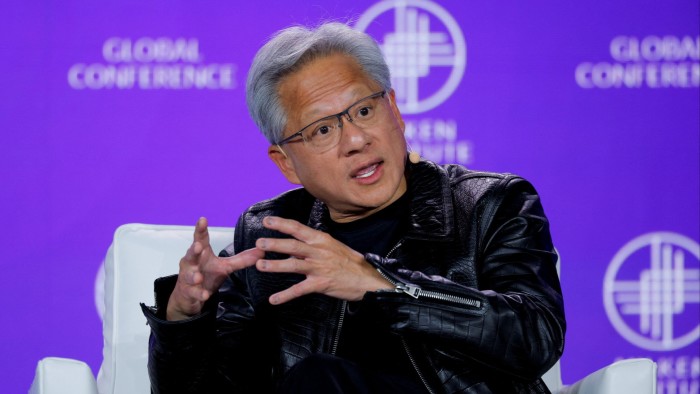Nvidia is seeking to reduce its reliance on Big Tech companies by striking new partnerships to sell its artificial intelligence chips to nation states, corporate groups and challengers to groups such as Microsoft, Amazon and Google.
This week, the American chip giant announced a multibillion-dollar US chip deal with Saudi Arabia’s Humain, while the United Arab Emirates announced plans to build one of the world’s largest data centres in co-ordination with the US government, as the Gulf states plan to build massive AI infrastructure.
These “sovereign AI” deals form a crucial part of Nvidia’s strategy to court customers far beyond Silicon Valley. According to company executives, industry insiders and analysts, the $3.2tn chipmaker is intent on building its business beyond the so-called hyperscalers — big cloud computing groups that Nvidia has said account for more than half of its data centre revenues.
The US company is working to bolster potential rivals to Amazon Web Services, Microsoft’s Azure and Google Cloud. This includes making “neoclouds”, such as CoreWeave, Nebius, Crusoe and Lambda, part of its growing network of “Nvidia Cloud Partners”.
These companies receive preferential access to the chipmaker’s internal resources, such as its teams who advise on how to design and optimise their data centres for its specialised equipment.
Nvidia also makes it easier for its cloud partners to work with the suppliers that integrate its chips into servers and other data centre equipment, for instance, by accelerating the purchasing process. In some cases, Nvidia has also invested in neoclouds, including CoreWeave and Nebius.
In February, the chipmaker announced that CoreWeave was “the first cloud service provider to make the Nvidia Blackwell platform generally available”, referring to its latest generation of processors for AI data centres.
Over recent months, Nvidia has also struck alliances with suppliers, including Cisco, Dell and HP, to help sell to enterprise customers, which manage their own corporate IT infrastructure instead of outsourcing to the cloud.
“I’m more certain [about the business opportunity beyond the big cloud providers] today than I was a year ago,” Nvidia chief executive Jensen Huang told the Financial Times in March.

Huang’s tour of the Gulf this week alongside US President Donald Trump showed a strategy the company wants to replicate around the world.
Analysts estimate deals with Saudi Arabia’s new AI company, Humain, and Emirati AI company G42’s plans for a giant data centre in Abu Dhabi will add billions of dollars to its annual revenues. Nvidia executives say it has been approached by several other governments to buy its chips for similar sovereign AI projects.
Huang is becoming more explicit about Nvidia’s efforts to diversify its business. In 2024, the launch of its Blackwell chips was accompanied by supporting quotes from all of the Big Tech companies. But when Huang unveiled its successor, Rubin, at its GTC conference in March, those allies were less visible during his presentation, replaced by the likes of CoreWeave and Cisco.
He said at the event that “every industry” would have its own “AI factories” — purpose-built facilities dedicated to its powerful chips — which represents a new sales opportunity running into the hundreds of billions of dollars.
The challenge for Nvidia, however, is that Big Tech companies are the “only ones who can monetise AI sustainably”, according to a neocloud executive who works closely with the chipmaker. “The corporate market may be the next frontier, but they are not there yet.”
Enterprise data centre sales doubled year on year in Nvidia’s most recent fiscal quarter, ending in January, while regional cloud providers took up a greater portion of its sales. However, Nvidia has warned investors in regulatory filings that it is still reliant on a “limited number of customers”, widely believed to be the Big Tech companies that operate the largest cloud and consumer internet services.
Those same Big Tech groups are developing their own rival AI chips and pushing them to their clients as alternatives to Nvidia’s.
Amazon, the largest cloud provider, is eyeing a position in AI training that Nvidia has dominated in the two and a half years since OpenAI’s ChatGPT kick-started the generative AI boom. AI start-up Anthropic, which counts Amazon as a large investor, is using AWS Trainium processors to train and operate its next models.
“There’s a lot of customers right now kicking the tires with Trainium and working on models,” said Dave Brown, vice-president of compute and networking at AWS.
Vipul Ved Prakash, chief executive of Together AI, a neocloud focused on open-source AI that became a Nvidia cloud partner in March, said the designation “gives you really good access into the Nvidia organisation itself”.
“If hyperscalers are eventually going to be competitors and stop being customers, it would be important for Nvidia to have its own cloud ecosystem. I think that is one of the focus areas, to build this.”
An executive at another neocloud provider said the chipmaker was “concerned” about Big Tech companies switching to their own custom chips.
“That’s why, I think, they are investing in the neoclouds. Half their revenues are hyperscalers but eventually they will lose it, more or less.”




